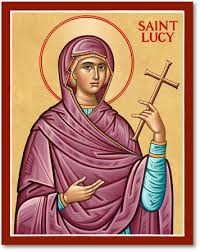HOMILY ADVENT WEEK 03 01 – Year II
Responding to Prophecy with Authority:
Memorial of St. Lucy
(Num 24:2-27; Ps 25; Mt 21:23-27)
*********************************************
How much authority do you exercise?
Today’s readings invite us to speak out with faith and exercise our authority as baptized believers in Jesus.
In the first reading from Numbers, the prophet Balaam twice asserts his authority to speak on God’s behalf, and finally, comes out with a striking prophecy – “A star shall come out of Jacob, and a sceptre shall rise out of Israel.” When Balaam uttered this prophecy, the Israelites were not much more than a ragged band of nomads and former slaves wandering in the desert. But Balaam saw them for who they would become, and that is how God sees us, clothed with the dignity and strength of Christ and filled with His Spirit, making this a hope-filled passage.
In the gospel, we have the sharply ironic scene of Jesus, whom we believe is the fulfillment of that prophecy by Balaam, precisely that star and sceptre in person, confronted by the religious leaders of Israel who don’t believe in him, who are resisting him and here, questioning his authority: “By what authority are you doing these things? And who gave you this authority?” Jesus very cleverly presents a counter-question to them, which they can’t answer without revealing their true intent – to trap him.
According to Bishop Robert Barron, the Greek word used for “authority” is most enlightening: exousia. It means, literally, “from the being of.” Jesus speaks with the very exousia of God, and therefore, his words effect what they say. He says, “Lazarus, come out!” and the dead man comes out of the tomb. He rebukes the wind and says to the sea, “Be still!” and there is calm. And the night before he dies, he takes bread and says, “This is my body.” And what he says is.
This is the authority of the Church. If we are simply the guardians of one interesting philosophical perspective among many, then we are powerless. If we rely on our own cleverness in argumentation, then we will fail. Our power comes—and this remains a great mystery—only when we speak with the authority of Jesus Christ.
Part of that authority will flow when we respond to Balaam’s prophecy with the attitude of the psalmist today: “Teach me your ways, O Lord.” The psalm goes on to describe that way of the Lord as one of mercy, steadfast love and humility. When we are open to hearing God’s truth, that God is first and foremost humble steadfast love and mercy, and strive to live that way in our lives, we will be able to speak with authority – our very presence will exude it through our peace and joy that comes from doing the will of God.
Another meaning for authority can be to “author life.” That is our call as well, to bless others, to love them, to affirm them, to see their God-given potential and draw it out by affirming them.
Another shade of meaning in that word exousia is that it is the power of a little child, whose innocence and powerlessness can melt the hardest heart. That is the power, the authority God chose to use in sending Jesus among us as a little child, who to show us the depth of God’s love for humanity, gave his life for us totally powerless on the cross, yet in that very action, demonstrating that exousia is the greatest power of all, leading to resurrection and the defeat of even death.
Members of the L’Arche movement exercise this kind of authority daily. Their role at l’Arche, and of all those who are close to people with intellectual disabilities, is to help them to discover that their life has meaning, that the community, the Church, society needs them and that they have a special capacity to touch hearts and to give life.
 Today we remember St. Lucy, who was born in Syracuse, Italy, and martyred about 304. Details of her life have been lost in the ensuing centuries and now exist mostly in legends. All we really know for certain is that this brave woman who lived in Syracuse lost her life during the persecution of Christians in the early fourth century. During the Middle Ages, people suffering from eye troubles began invoking her aid because her name is derived from lux or light. She is also associated with festivals of light, especially in Scandinavia. Her veneration spread to Rome so that by the sixth century the whole Church recognized her courage in defense of the faith.
Today we remember St. Lucy, who was born in Syracuse, Italy, and martyred about 304. Details of her life have been lost in the ensuing centuries and now exist mostly in legends. All we really know for certain is that this brave woman who lived in Syracuse lost her life during the persecution of Christians in the early fourth century. During the Middle Ages, people suffering from eye troubles began invoking her aid because her name is derived from lux or light. She is also associated with festivals of light, especially in Scandinavia. Her veneration spread to Rome so that by the sixth century the whole Church recognized her courage in defense of the faith.
The Eucharist is itself a living out of this authority of God in Jesus – this exousia of merciful steadfast love experienced by us through word and especially through humble gifts of bread and wine transformed into the body and blood of Jesus.
May our celebration strengthen our faith in Jesus as Son of God, Lord, Savior, Messiah, and empower us to share that faith and love with others with the very exousia of God, as did St. Lucy.



